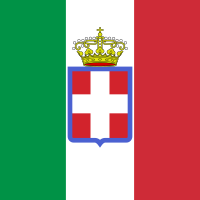Regio Esercito
|
Regio Esercito Italiano Royal Italian Army |
|
|---|---|

War Flag of the Regio Esercito
|
|
| Active | 1861–1946 |
| Country |
|
| Allegiance | King of Italy |
| Type | Army |
| Size | 5,000,000 (1915) 3,000,000 (1939) 6,000,000 (1943) |
| Colors | Green, White and Red |
| Anniversaries | 4 November |
| Engagements |
Italian War of Independence Mahdist War Italo-Ethiopian War (1895–96) Boxer Rebellion Italo-Turkish War World War I Pacification of Libya Italo-Ethiopian War (1935–36) Spanish Civil War Italian invasion of Albania World War II |
| Commanders | |
| Ceremonial chief | First Marshal of the Empire |
| Notable commanders |
Victor Emmanuel II, Pietro Badoglio, Luigi Cadorna, Armando Diaz Alfredo Guzzoni |
The Royal Italian Army (Italian: Regio Esercito Italiano) was the army of the Kingdom of Italy from the unification of Italy in 1861 to the birth of the Italian Republic in 1946. In World War II the Royal Army fought first as part of the Axis (1939–43) and then as part of the Allies (1943–45). After the monarchy ended, the army changed its name to become the Italian Army (Esercito Italiano).
The Regio Esercito dates from the proclamation of the Kingdom of Italy, following the unification of Italy in 1861 after the Papal States were seized. On 4 May 1861, Manfredo Fanti signed the creation decree, by which the new army was to replace the previous Armata Sarda (Army of the Kingdom of Sardinia) and the Army of the Two Sicilies.
The first two task of the new organization were the repression of brigandage in southern Italy against irregular and guerrilla forces (mixed with bands of various criminals), who refused to accept the suppression of the Kingdom of Two Sicilies), and the Third War of Italian Independence. On 20 September 1870, the IV Corps captured Rome, which had remained under Papal control up until then.
On 8 February 1885, a corps of fewer than 1,000 soldiers landed at Massaua, Eritrea, starting the creation of an Italian colonial empire. The Italian advance was halted by an abysmal defeat at the Battle of Adwa by Ethiopian forces. The following year, as part of the Italian collaboration with the international pacification program after the revolt against the Turkish domination in Cyprus, another corps disembarked at Candia. On 14 July 1900, another expeditionary force was constituted to suppress the Boxer Rebellion in China in defense of the European protectorates.
...
Wikipedia
